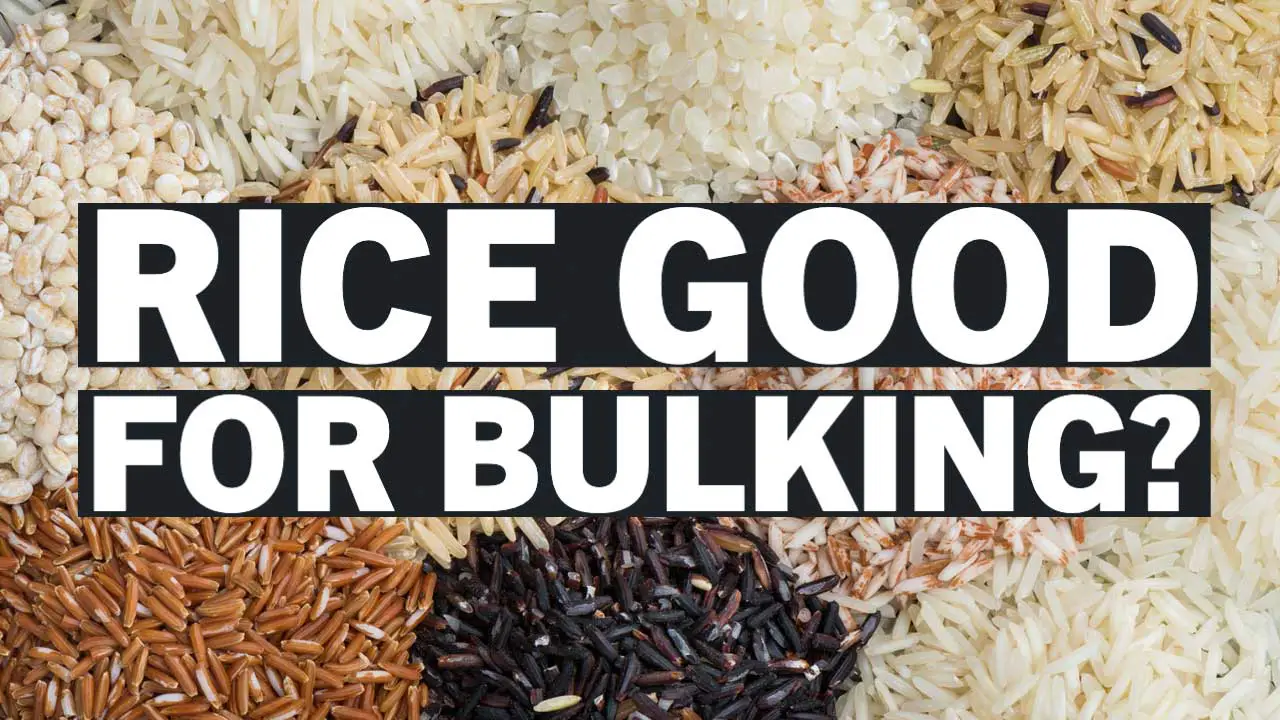Why is Bulking So Hard For Me?

ListedFit is reader-supported. When you buy through links on our site, we may earn a small commission.
We hear an awful lot about the best techniques to lose weight, but for a lot of people, intentional and purposeful weight gain, commonly referred to as bulking, is much more appealing.
It increases your physical presence, can make you feel more confident when you walk into a room, and if bulking is done well, it brings with it great associations of strength and fitness.
Table of Contents
Gains, Gains, Gains.
Colloquially known as gains or getting swole, the concept of bulking isn’t all that complicated: the idea is to get physically bigger, and this is done by eating more calories than you burn.
But as you might imagine, there’s more to it, since the term bulking most often implies getting bigger with muscle, not with fat.
To balance all of those additional calories and put that extra fuel to good use, you want to exercise regularly. And of course, not any exercise will do.
If you’re bulking, you’ll want to focus on workouts that are directly focused around building bigger and stronger muscles, usually weightlifting and powerlifting.

Bulking is an important part of putting on the weight and muscle that you’ll eventually refine for better definition (a companion stage known as cutting, in which the focus is on overall physique rather than growth)
The title of this article acknowledges a nearly universal feeling about bulking – it’s hard to do!
However, trying to maintain control over one’s body weight and shape is always difficult; consider that people trying to lose weight often have similar gripes.
Bulking is challenging for everyone, but over time and with patience, it can be done successfully.
How Does Bulking Work?
The human body is a complex machine, so while there are a number of factors that can influence bulking, the main things to do are eat more and exercise in ways that focus on muscle growth rather than fat loss.
Bulking requires good nutrition, or what you feed your body in order to build muscle. Obviously, you’ll need to eat more, though perhaps not as much more as you might think.

According to a 2019 study titled “Nutrition Recommendations for Bodybuilders in the Off Season,” a good starting point for bulking is to eat 10% more calories than you’d normally eat – what’s called your “maintenance calories.”
This slight but noticeable increase is usually referred to as a lean bulk, as opposed to a dirty bulk, which can increase your caloric intake by as much as 50% but is less effective at building muscle mass.
According to “Gaining Muscle Mass in a Deficit vs. Bulking,” a 2018 research review, lean bulking is more effective for all but the skinniest novices at building more muscle without major fat gains.
When you’re eating more calories, the key is to make your additional 10% (and really, all of the calories you ingest) good calories: whole and minimally processed foods, rather than lots of sugar and fast food.
It bears repeating that the goal of bulking is not to just put on weight — it’s to put on weight in the form of muscle.
Macros Are Important
You’ll also want to pay some attention to your macro nutrients, or protein, carbohydrates, and fats, as they can play an important role in how your body responds to your additional caloric intake.
Instinct, along with casual anecdotal evidence, suggests that you’d want to eat more protein, and that’s largely true, but protein isn’t all you want to eat if you’re bulking.

You’ll want to make sure you’re eating enough healthy carbohydrates for energy and hormone regulation, and believe it or not, you want to ingest a significant amount of healthy fat as well.
Why fat? In addition to providing you with energy, healthy fats are also essential for hormone regulation. The right balance of hormones in the body is essential for building muscle.
How Much Of Each Macro Should You Eat For Bulking?
An approximate breakdown, at least to start, is 40% protein, 40% carbohydrates, and 20% fat, though as you progress, you may find that you actually need to increase your fat intake and decrease your protein calories for better results.
An important thing to remember when bulking is that everyone responds to it a bit differently, so after a few weeks, you’ll want to stop and reassess.
Are you seeing positive incremental results with what you’re doing?
If not, that’s a sign that you’ll want to make adjustments, perhaps changing your macronutrient percentages or adding more calories, 5% at a time, for up to 20% over your total maintenance calories.
Exercise
If nutrition is one part of bulking, the other, of course, is exercise, or increasing your muscle mass. If you’re bulking, this means skipping cardio-type activities like running, cycling, and swimming, and focusing more on weight training and resistance exercises like pull-ups and push-ups.
How does this process work? Well, we all have muscles. The more we use them, the bigger and stronger they become; the muscles we don’t use very much get smaller and weaker.

If you’re interested in bulking, you want to work your muscles in an intense way on a regular basis, which damages the muscle fibers — a good thing, in this case, since between workout sessions they build back up bigger and stronger each time.
This is why rest days are so important. If you can maintain this pattern of tear and repair, you’ll see encouraging results.
How Long Does It Take To See Weight Gain Results?
It’s important to remember that bulking is a gradual process and not a fast one, since building lean muscle does take some time.
While you’ll certainly feel stronger within a few weeks of increased eating and weight training, noticeable results can take a bit longer, maybe a month or two.

We can often be our own worst critic when it comes to changes to our bodies, and because we look at ourselves every day (and usually several times a day), it can be hard to see those minor changes.
What a lot of trainers recommend is taking a photo of yourself every week. After a few weeks, you can observe them side by side and visually track your progress.
How Often Should I Weigh Myself When Bulking?
When you start bulking, you may be tempted to weigh yourself all the time.
While you certainly don’t want to become a slave to your bathroom scale, weighing yourself on a daily basis is actually a good idea.
This isn’t to make yourself unnaturally fixated on minor increases and decreases, since body weight is dependent on a lot of factors and can fluctuate day to day, but weighing yourself every day gives you a lot of data points to work with.
Over the course of several weeks, you’ll be able to recognize patterns in your weight.

Additionally, if you also track your exercise and track what you eat (which you should), that’s a lot of raw data.
When you look at all of it together, you should be able to see which combinations of factors work best for you in your bulking endeavors.
There are a number of fitness apps and smart scales available to help you keep track of your data, and many will create charts for you, which is helpful for visualizing your progress.
This isn’t entirely necessary, though, especially if you prefer a more tactile approach; you can absolutely keep it old school and track your data in a notebook.
How Long Does it Take For a Skinny Person to Gain Weight?
In short, a while! Your body needs a lot of things to build muscle, but the main thing it needs is time.
Increasing your caloric intake substantially is also important, and if you’re especially skinny, you may have some options here.
While the 2018 research review cited above suggests that very skinny people can bulk a bit faster by eating much more than 20% above their maintenance calories, you still run the risk of adding more fat that muscle if you’re not exercising enough.

A 2019 study titled “Effects of Different Dietary Energy Intake Following Resistance Training on Muscle Mass and Body Fat in Bodybuilders” affirms that trying to bulk too quickly often results in more fat gain than is desirable.
Bulking takes real commitment, it takes great intention, and it takes a remarkable amount of patience.
This is not a fast process, nor should it be. If you have all three of these attributes, you’ll slowly but surely achieve your bulking goals.
Is Bulking Harder Than Cutting?
When it comes to achieving fitness goals, many people employ the strategies of bulking and cutting to gain muscle mass and lose body fat. But, the question remains: which is harder, bulking or cutting? The answer is not as straightforward as one might think.
Bulking refers to the process of increasing calorie intake with the aim of building muscle mass. During this phase, the individual consumes more calories than they burn, in order to provide the body with the necessary nutrients to build muscles. On the contrary, cutting is the process of eating fewer calories than one burns in an attempt to lose body fat while preserving lean muscle mass.
The difficulty of bulking and cutting can vary based on individual circumstances. For some, bulking can be challenging due to the need to consume more food than usual. This may require significant effort and planning around meal preparation, meal frequency, and food selection. In addition, muscle gain does not occur as quickly as many might hope, requiring patience and perseverance during the bulking phase.
On the other hand, cutting can be mentally and physically taxing, as it demands adherence to a calorie deficit. This requires discipline to resist energy-dense, high-calorie foods that may appeal to cravings. Furthermore, cutting can affect mood and energy levels, making day-to-day life more difficult for some individuals.
In some cases, people may find that bulking is harder due to the stomach discomfort and required effort in consuming a larger quantity of food. For others, cutting may be more difficult as it challenges their willpower and may lead to feelings of hunger and fatigue. Additionally, the rate of progress during cutting can be slower than desired, thus testing the individual’s resolve and patience.
Ultimately, the answer to whether bulking is harder than cutting varies from person to person, influenced by factors such as body type, personal preferences, and individual experiences. Each phase has its own set of challenges, and it is essential for anyone pursuing a fitness goal to have a clear understanding of their own capabilities, limitations, and preferences in order to make informed decisions about their training and nutritional approaches.
Bulking is Not Forever…
While bulking for two or three months at a time can be good for weight and muscle gains, you don’t want to always be bulking.
Once you’re satisfied with your short term gains, you’ll want to back off on how much you’re eating so you can focus on cutting, or refining your muscle definition.
And as always, before you start bulking or making any significant changes to your diet and exercise, we recommend discussing your plans with a physician for personalized guidance and advice.
Frequently Asked Questions
Is bulking good for your health?
Bulking can be good for your health if done in a balanced and controlled manner. It helps with increasing muscle mass and strength, which can contribute to improved physical fitness.
However, it’s essential to ensure you’re getting plenty of nutrients and not overloading on calories and unhealthy foods.
What are the main differences between bulking and cutting?
Bulking focuses on increasing caloric intake to gain muscle mass, while cutting involves reducing calorie intake to shed excess body fat.
In bulking, the goal is to put on weight, primarily muscle mass, whereas cutting aims to lose weight, mainly body fat, while preserving as much muscle as possible.
Is it difficult to cut without losing muscle?
Cutting without losing muscle can be challenging, but not impossible.
The key to preserving muscle while cutting is maintaining a strength training routine and consuming a sufficient amount of protein to support muscle development and repair.
It’s also essential to create a controlled calorie deficit to avoid losing too much muscle.
How do I start bulking up?
To start bulking up, increase your daily calorie intake and follow a well-planned resistance training programme that targets multiple muscle groups.
Focus on consuming nutrient-dense foods, including lean proteins, complex carbohydrates, and healthy fats. It’s important to gradually increase caloric intake to avoid excessive fat gain.
How can I transition from bulking to cutting?
Transitioning from bulking to cutting involves gradually reducing calorie intake and fine-tuning your training routine to focus on fat loss without sacrificing muscle mass.
It’s crucial to modify your diet, ensuring you maintain protein consumption while cutting calories mainly from fats and carbohydrates. Monitor your progress, adjust your plan accordingly, and maintain consistency.
What are some tips for a successful cut?
For a successful cut, here are a few tips:
1. Determine a realistic, sustainable calorie deficit.
2. Maintain an adequate protein intake to support muscle retention.
3. Combine cardiovascular exercise with strength training to maximize fat loss.
4. Keep track of your progress and make adjustments as needed.
5. Stay consistent with your diet and exercise regimen.
6. Be patient and understand that progress takes time.
Author
- Danny Loeb is a qualified Personal Trainer, Fitness Model and Writer. He enjoys blogging about health and fitness, messing around with Photoshop, and sharing his experiences with everyone.
Latest entries
 NutritionFebruary 6, 2024What Are Fillers in Supplements? – Unveiling Inactive Ingredients
NutritionFebruary 6, 2024What Are Fillers in Supplements? – Unveiling Inactive Ingredients FitnessAugust 23, 2023Best Post-Workout Foods: Great Ideas for Recovery and Results
FitnessAugust 23, 2023Best Post-Workout Foods: Great Ideas for Recovery and Results BulkingJuly 26, 2023Is Rice Good for Bulking? Unveiling the Truth
BulkingJuly 26, 2023Is Rice Good for Bulking? Unveiling the Truth CultureJuly 15, 2023Why Do People Hate Planet Fitness? Read This Before You Join!
CultureJuly 15, 2023Why Do People Hate Planet Fitness? Read This Before You Join!
Affiliates:
This post may contain affiliate links that at no additional cost to you, the site may earn a small commission. We only recommend products we would use ourselves and all opinions expressed on this site are our own.
General Advice:
The information provided in this article is for general informational purposes only. It is not intended as a substitute for professional advice. Always consult with a qualified healthcare professional before starting any new diet, exercise program, or making changes to your health routine.
Accuracy Advice:
While we strive to provide up-to-date and accurate information, the content in this article may not reflect the most current research or medical guidelines. We encourage readers to do further research and consult with professionals for more personalized advice.
Our Recommendations:
The products and services mentioned in any of our articles are recommended based on our independent research and personal experience. We are not sponsored by any company. We aim to suggest products and services we believe are of high quality and could be beneficial to our readers.






